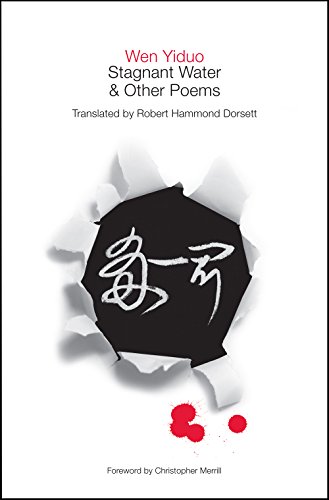Items related to Stagnant Water & Other Poems

Synopsis
Poetry. Asian & Asian American Studies. Translated from the Chinese by Robert Hammond Dorsett, MD. Foreword by Christopher Merrill. Calligraphy by Huang Xiang. The temptation, when evaluating a poet gunned down by his government, is to start there, with the politics that led to his murder. But Wen Yiduo (1899-1946) was much too complex and heterodox to comfortably wear the martyr's robe, his works too nuanced and unsettled to be a paragon of any revolution. His poems explore religion and rickshaws, contain the chrysanthemums of Chinese folklore and the mud of contemporary times, and dare readers to challenge prevailing conceptions, even to render their own cynicism as hope. Mao blamed the Nationalists for Wen's death, thus elevating him to something like mythic status, yet the poet needed no such validation. He resisted easy classification. He was a writer whose ballast was in ideas and logic, while remaining fresh to the point of innovation. In Dorsett's interpretation, we revel in the details of Wen's work: lyric, ironic, passionate, and above all, politically aware but ideologically free. It represents a long overdue attempt to bring international attention to one of China's preeminent 20th- century writers.
"synopsis" may belong to another edition of this title.
About the Author
The son of a well-to-do Hubei family and a product of its privileged status, Wen Yiduo was introduced to the West at an early age, eventually studying western painting in Chicago and New York from 1922-25. It was during this time that his first collection of poetry, Hongzhu (Red Candle) was published. Upon his return to China, he became a university professor, a leading literary critic and scholar, and soon an outspoken critic of the Nationalists. His speeches became more political and defiant as the army's suppression of student demonstrations became bloodier. On June 6, 1946 at 5pm, after stepping out of the office of the Democratic Weekly, Wen Yiduo died in a hail of bullets. Mao blamed the Nationalists, and thus Wen was transformed into a paragon of the revolution. STAGNANT WATER AND OTHER POEMS is Wen's second and final collection.
Robert Dorsett studied Chinese at the Yale-in-China Program at the Chinese University in Hong Kong. He received an M.D. degree from the State University of New York and completed his training in pediatrics at Cornell. He also has an M.F.A. degree from New York University, where he subsequently taught creative writing. Robert has translated many individual poems and essays from the Chinese. With David Pollard, he translated the memoirs of Gao Ertai, In Search of My Homeland: A Memoir of a Chinese Labor Camp (Harper Collins, 2009). STAGNANT WATER is his second book of translations. He has also published his own poetry in The Literary Review, The Kenyon Review, Poetry, and elsewhere. Formerly a senior physician at Kaiser Hospital Oakland, he now writes full time.
"About this title" may belong to another edition of this title.
- PublisherBrightCity Books
- Publication date2014
- ISBN 10 0979589843
- ISBN 13 9780979589843
- BindingHardcover
- LanguageEnglish
- Number of pages87
- Rating
(No Available Copies)
Search Books: Create a WantCan't find the book you're looking for? We'll keep searching for you. If one of our booksellers adds it to AbeBooks, we'll let you know!
Create a Want